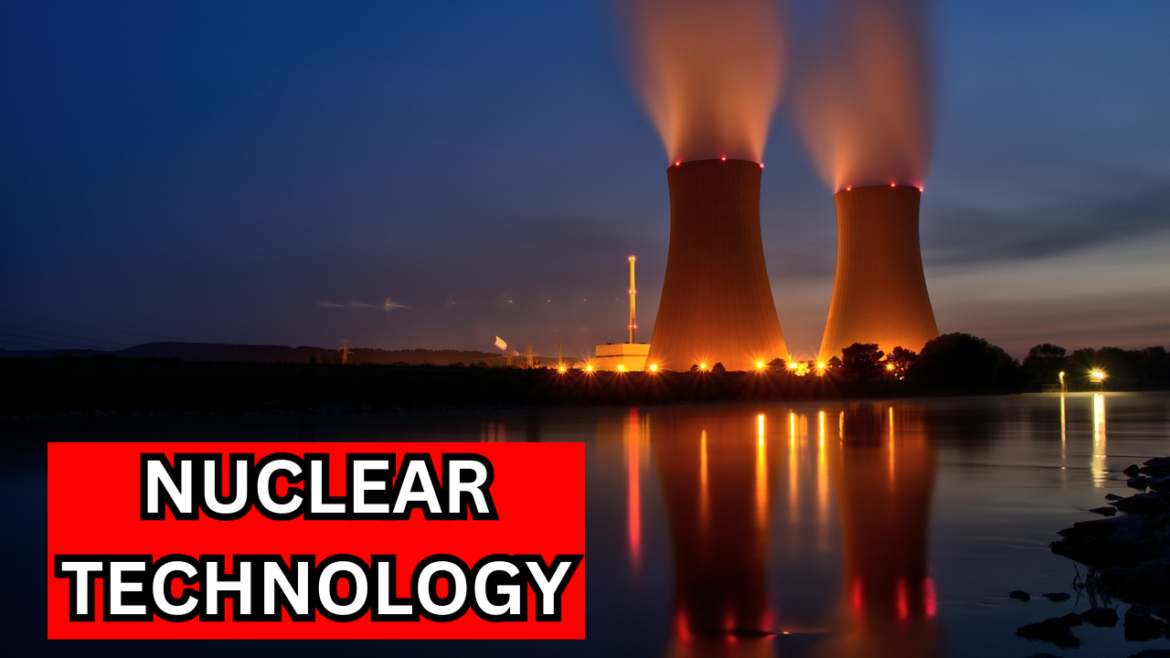Nuclear technology has been a game changer in many fields, affecting everything from energy production to medicine. Its influence on the global economy is enormous, shaping industries, employment, and international relations. While nuclear technology is often associated with power plants and weapons, its impact goes far beyond that. It has economic benefits and challenges that influence countries all over the world.
In this article, we will take a closer look at how nuclear technology affects the global economy, both positively and negatively, while considering its future potential.
1. Nuclear Power and Energy Supply:
Powering the World’s Economy:
Nuclear energy is one of the primary approaches to nuclear technology that influences the global economic system. It performs a critical function in presenting a stable, long-term power delivery. Energy is the lifeblood of current economies, fueling industries, houses, transportation, and technology. Nuclear energy vegetation technology is a considered technology part of the world’s power, about 10% globally, making it an important power supply for many nations.
Unlike fossil fuels consisting of coal or herbal gas, nuclear energy produces electricity without emitting greenhouse gases. This has made it an attractive choice for international locations looking to reduce their carbon footprints even as they assemble the growing power demand. Nuclear power is frequently considered a part of the solution to weather change, as it enables reduced reliance on polluting strength sources.
The regular, large-scale electricity manufacturing from nuclear plant life supports industries that rely on non-stop power, consisting of production and tech sectors. This reliability boosts financial productiveness with the aid of ensuring that strength shortages or fluctuations don’t disrupt corporations or everyday lifestyles.
Reducing Dependence on Fossil Fuels:
Nuclear energy facilitates nations to lessen their dependence on fossil fuels, which are challenged by price volatility and geopolitical tensions. For example, oil charges can vary wildly because of activities like conflicts inside the Middle East or changes in OPEC policies. By having a stable nuclear energy infrastructure, countries can protect their economies from those strong shocks. This contributes to energy safety, an essential issue of national financial balance.
When international locations spend money on nuclear power, they could keep cash in the long term by reducing their reliance on imported gas. The fee of technology nuclear power plants is particularly low as soon as they are constructed, making them economically possible through the years. This facilitates countries to avoid spending big amounts of money on uploading coal, oil, or natural gas.
2. Employment and Economic Growth:
Job Creation in Nuclear Industries:
Nuclear technology additionally contributes to economic growth via activity introduction. Building and preserving nuclear electricity flora, growing new technology, and accomplishing studies require an enormously skilled staff. Engineers, scientists, technicians, creation people, and lots of other specialists are needed to help the nuclear enterprise.
In addition to energy plants, nuclear technology is used in industries like medicinal drugs, agriculture, and research, all of which create jobs. For instance, nuclear medicinal drug uses radioactive substances to diagnose and treat illnesses, and this region employs an extensive range of professionals, along with medical doctors, radiologists, and laboratory technicians.
The introduction of jobs inside the nuclear industry enables enhanced local economies. Workers employed in those fields tend to have specialized abilities and are often properly compensated, contributing to higher wages in the regions wherein nuclear centers are positioned. This, in turn, stimulates economic pastime in surrounding regions, from housing to neighborhood agencies.
Boosting Innovation and Research:
The nuclear technology is likewise at the vanguard of clinical research and innovation. Investment in nuclear science regularly results in technological advancements that can gain different industries, which include electronics, healthcare, and area exploration. Innovation driven by nuclear research can boost economic boom by developing new markets and industries.
For instance, nuclear fusion, a capability for future power supply, has the possibility of revolutionizing how we produce strength. Although it’s miles still inside the experimental degree, a hit nuclear fusion would offer truly countless, clean strength. This may lead to big economic benefits by lowering strength fees and establishing new investment opportunities.
3. Nuclear Technology in Medicine:
The Role of Nuclear Medicine:
The nuclear technology plays an essential function in modern-day medicine, particularly in the fields of diagnostics and treatment. Nuclear medicinal drugs include using small quantities of radioactive materials to diagnose and deal with illnesses including most cancers, heart sickness, and thyroid situations. This technology has stepped forward patient effects and helped lessen healthcare charges by way of enabling in advance, more accurate diagnoses and more effective remedies.
The financial impact of nuclear medicinal drugs is sizable. By improving healthcare, nuclear technology can boost existence expectancy, lessen the weight on healthcare structures, and enhance productivity. Healthier populations are more able to make contributions to their economies, while healthcare improvements pushed by nuclear technology help to hold healthcare costs under control.
Economic Impact on the Healthcare Industry:
The healthcare enterprise has advantages financially from the nuclear technology. Hospitals, studies labs, and healthcare providers make investments heavily in nuclear clinical equipment which includes PET and CT scanners. This drives the call for nuclear substances, growing a marketplace for isotopes utilized in clinical imaging and treatments. Companies that manufacture these machines and provide radioactive substances generate sizeable revenue, contributing to the overall financial system.
Additionally, the price financial savings from early analysis and remedy through nuclear remedy result in reduced health facility stays and fewer surgical procedures. These economic advantages are felt by each individual and healthcare system, making nuclear technology an essential part of the global healthcare economic system.
4. International Relations and Trade:
Exporting Nuclear Technology:
Nuclear technology has become a key player in global alternate. Countries with superior nuclear industries export their technologies to other international locations. This includes not only the most effective nuclear reactors but also knowledge, schooling, and renovation services. For instance, nations like the United States, France, and Russia have developed strong nuclear industries and often promote their technologies to countries that might be just beginning to build their nuclear-strength infrastructure.
These worldwide partnerships technology financial benefits for each exporting and uploading country. Exporting nations advantage sales from sales, even as importing nations gain get right of entry to a dependable energy source and the possibility to develop their nuclear industries. This alternate can support monetary ties and result in additional collaborations in science, technology, and enterprise.
Nuclear Agreements and Diplomacy:
Nuclear technology additionally influences international diplomacy. Countries often input into nuclear agreements to share technology, ensure protection, or control nuclear waste. These agreements could have full-size economic implications, as they contain billions of dollars in investments and the advent of lengthy-term trade relationships.
Diplomatic efforts to prevent the spread of nuclear guns, together with treaties and global policies, also play a function in the worldwide economy. By ensuring that nuclear technology is used for peaceful functions, these agreements assist in maintaining stability in worldwide markets. Nuclear injuries or conflicts involving nuclear guns could have devastating monetary outcomes, so diplomatic efforts to prevent such crises are critical for retaining global financial stability.
5. Challenges and Risks:
High Initial Costs:
While nuclear technology gives many advantages, it also comes with challenges that affect the global economic system. One of the number one drawbacks is the high cost of building nuclear power plants. These projects require huge premature funding, frequently amounting to billions of bucks. Additionally, the long lead instances for construction, now and again up to a decade, mean that the monetary returns aren’t on the spot.
These high preliminary costs can deter some international locations from investing in nuclear energy, particularly if they lack the financial resources to fund such huge tasks. Governments frequently must offer subsidies or incentives to encourage non-public agencies to put money into nuclear technology, which can pressure public budgets.
Nuclear Accidents and Environmental Concerns:
The capability for nuclear injuries, although uncommon, is every other economic hazard. Disasters just like the Chernobyl accident in 1986 and the Fukushima disaster in 2011 had some distance-attaining monetary outcomes. The immediate fees of such injuries encompass damage to belongings, lack of lifestyle, and environmental cleanup. However, the lengthy-time period monetary results can be even huge, as they result in a lack of public trust in nuclear technology, reduced tourism, and influences on agriculture and fishing industries.
Environmental issues, including the disposal of nuclear waste, additionally pose challenges. Managing nuclear waste is high-priced, and finding secure, lengthy-term garage solutions remains a international trouble. These demanding situations can increase the overall costs of nuclear technology, making it much less economically appealing for a few countries.
6. The Future of Nuclear Technology:
Looking ahead, the future of nuclear technology is probable to preserve shaping the global financial system in familiar and new ways. Advancements like nuclear fusion, small modular reactors (SMRs), and upgrades in nuclear waste management could make nuclear power extra accessible and safer.
If nuclear fusion becomes a truth, it can revolutionize the electricity market by offering almost limitless, clean electricity. This could have huge monetary implications, probably decreasing power expenses and boosting industries that depend on reasonably priced and ample energy. However, significant research and investment are nevertheless needed earlier than fusion will become a realistic strength source.
Conclusion:
Nuclear technology plays an important function in the global financial system through powering industries, growing jobs, advancing healthcare, and influencing worldwide relations. While it offers many advantages, it also comes with dangers and demanding situations that need to be controlled carefully to ensure a safe and prosperous future. The future of nuclear technology holds the capacity for even more economic effect, mainly as innovations emerge and world energy desires continue to rise.



